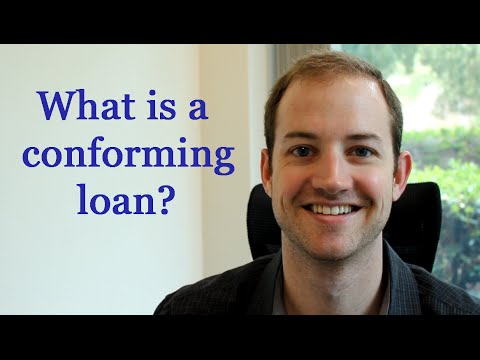Navigating the world of home financing can be akin to setting sail in uncharted waters. In the vast ocean of mortgage options, conforming loans represent a beacon of reliability and accessibility. As we cast off into 2023, let’s dive deep into the nuances of conforming loan limits – understanding what they mean for you as a homebuyer or homeowner and how you can leverage this knowledge to secure your dream home without drowning in uncertainty.

Conforming Loan Limits 2023: An Essential Overview

Understanding Conforming Loan Frameworks
In the grand scheme of mortgages, a conforming loan is quite the catch. Simply put, it’s a home loan that doesn’t exceed a certain dollar amount and aligns with the criteria set by Freddie Mac and Fannie Mae, the twin pillars of mortgage finance. But why does this matter, you might wonder? Well, this magic number, known as the conforming loan limit, usually comes hand in hand with lower interest rates, making it a smart financial move for borrowers with sparkling credit.
So, what happens when you step beyond these limits? You wade into the waters of non-conforming loans, or the so-called jumbo loans, larger by nature and a bit more complex to navigate. Now, these two housing giants, Freddie and Fannie, play by their rules, purchasing mortgages from lenders and giving those lenders the liquidity to reel in more borrowers.
Looking back, the story of conforming loan limits has been a tale of adaptation, with the thresholds evolving to reflect economic tides. This historical context is key—it helps us appreciate the changes we’re seeing today.

Exploring the 2023 Conforming Loan Limits
As we greet 2023, we’ve seen the conforming loan limits take a leap to $766,550 for most areas. It’s like watching a pole-vaulter clear a higher bar: It’s impressive, and it’s impacted by a whole slew of economic factors. This bump from 2023’s $726,200 is no mere fluke. It mirrors our fast-climbing home prices, though it’s more than a reaction to market frenzy—it’s a calculated response to help average Joe’s and Jane’s afford homes without needing a treasure chest of gold!
Every state has its draw, and consequently, its own set of limits. From the soaring peaks of Colorado to the sun-kissed shores of Florida, geographical variations play a huge role in these figures. This isn’t a one-size-fits-all hat—it’s tailored to the economic wardrobe of each locale.
The Impact of Conforming Loan Limits on Borrowers
But let’s get down to brass tacks—how does this all affect you? Firstly, the snug relationship between loan limits and mortgage rates can mean a smoother journey to homeownership. If you can secure a conforming loan, you’re likely to snag a lower interest rate, which has a domino effect on the rest of your financial picture. It can broaden your borrowing horizon, allowing you to cast your net wider when house hunting.
However, remember, just like a suit, you want the best fit—and sometimes, a conforming loan might be a little too tight across the shoulders. That’s when you might need to explore other options.
Demystifying the Loan Limits Increase: Behind the Numbers
The decision to crank up the loan limits isn’t taken lightly, rest assured. Economic indicators wield their influence here—the job market, inflation rates, consumer spending, and the collective bank account of our country. These adjustments aim to strike a balance between making housing affordable without setting off market volatility. It’s as if housing affordability and market stability are in a dance-off, and it’s up to regulators to choreograph the routine expertly.
Economists and market maestros have chimed in on this change, some lauding the adjustments, while others are cautiously circling the punch bowl. Predictions are swirling about how this could shape real estate pricing, adding a spicy dash of speculation to the predictions stew.
Navigating the Conforming Loan Process in 2023
Here’s where we roll up our sleeves. To get your hands on a conforming loan, you’ll need to embark on a quest—the quest for the right documentation, acing eligibility requirements, and filling out applications with the precision of an archer. You might think this is a course you could chart with your eyes closed, but often it’s the small icebergs that sink the ship. Keep an eye out for common pitfalls, and use resources at your disposal, like our very own loan amount And payment calculator, to avoid running aground.
Conforming Loan Limit Changes: Real Estate Market Reactions
With new loan limits hitting the scene, the real estate market is like a theater with a new play debuting. Home prices, buyer demand, and the vibe of the market—all are feeling the ripple effects. Lenders are tuning their strategies, matching their mortgage offerings to this updated rhythm. It’s worth taking a moment to analyze the 2023 market in light of these limit increases—it’s like listening to Smash Mouth ‘s All star with fresh ears.
Case Studies: Conforming Loans in Action
The proof is in the pudding, as they say. So let’s scoop up some stories where conforming loan limits have either made dreams come true or caused a bit of a headache. We’ll walk through the journeys of those who’ve navigated the choppy waters successfully, and those who’ve encountered storms along the way. It’s a real mixed bag with varied outcomes depending on the housing market and local economy.
Expert Perspectives on the Conforming Loan Limits
Cue interviews with mortgage captains—who’ve seen it all—and financial advisors, dropping nuggets of wisdom on the implications of these new limits. These voices in the industry offer both GPS coordinates and cautionary tales for future lending practices and economic growth.
Conforming Loan Limit Myths Debunked
Let’s clear the fog on some of the myths floating around about conforming loans. There’s a need for data-driven clarity to cut through the myths—like how Taylor Swift ’ s Eras tour movie cuts through the noise of the music scene. It’s about balancing hope with a healthy dose of skepticism and revisiting the basics in light of these misconceptions and assumptions.
The Future Avenues for Conforming Loan Limits
Gazing into the crystal ball, what might the future hold for conforming loan limits? Predictions are as varied as the best biographies on the market Best Biographies, from subtle trends to potential breakthroughs that could reshape the mortgage lending scene. How will tech influence underwriting standards? Only time will tell, but it’s crucial to be ready for the shifts.

Conclusion: Embracing the Dynamics of Conforming Loans

After sailing through the intricacies of conforming loan limits for 2023, we’ve charted a course that brings us back to the importance of understanding and adapting to these financial frameworks. Staying informed is not just an option; it’s essential in an ever-evolving mortgage environment. So let’s join hands and step forward with confidence, ready to make savvy decisions in the world of lending. Onwards, fellow navigators, to the shores of informed borrowing and wise investment decisions!
Fun Trivia and Interesting Facts About Conforming Loans
Welcome, folks! If you’re in the market for a conforming loan, you’re in for a wild ride – numbers, requirements, and all sorts of financial gymnastics. But hey, don’t sweat it; we’re going to break things down, have a little fun, and dish out some juicy trivia.
Let’s Talk Numbers
Alright, everybody loves crunching numbers… okay, maybe that’s a stretch, but hang tight, here’s a bit of math fun to brighten your day! Did you know that the limits for a conforming loan can feel like a brainbuster you’d find on your favorite puzzle site? They can be quite the workout for your noggin, akin to solving algebra with Mathpapa at your side. These limits adjust annually based on average housing prices. So just when you think you’ve got it all figured out, bam! — change hits you like a calculus quiz you didn’t study for.
The Contingency Buffet
Here’s an interesting tidbit about the home-buying process: contingencies are like the condiments at a hot dog stand — there’s a variety, and you’ve gotta be picky. When you’re securing a mortgage, there are heaps of ’em. One of the better-known ones is the loan contingency, which ensures that if your funding falls through, you’re not stuck holding the bag. Think of it as a get-out-of-jail-free card, except it’s more like get-out-of-buying-the-house-free. And remember, not all contingencies are created equal! Brush up on the particular “Contingency” ditties to make sure your deal is as smooth as butter.
Credit Report Chronicles
Time to talk about the gatekeeper of the mortgage world — your credit report. This little dossier on your financial life is more scrutinized than a diamond under a jeweler’s loupe. Every lender flips through your “Credit Report” as if it’s a mystery novel, looking for twists, turns, and character development (a.k.a. your credit usage and payment history). And just like a bestseller, the plot better be good if you want that conforming loan.
Building Blocks of the Conforming Loan
Do you know those massive LEGO sets with an intimidating number of pieces? That’s kind of what getting a Construction Loan feels like, except it’s not just plastic bricks; it’s the bank handing you a hefty stack of cash to build your dream home. But unlike a construction loan, a conforming loan is like the standard LEGO set. It’s got its limits but, stick within the parameters, and you’ll create something awesome — like buying that dream house already built.
So there you have it – a smorgasbord of facts and fun about the thrilling world of conforming loans. Who knew mortgages could be such a hoot? Keep these tidbits in your pocket, and you’ll navigate the conundrums of conforming loans like a pro – no sweat!

What does it mean if a loan is conforming?
When a loan is labeled “conforming,” it’s basically playing by the rules set by Fannie Mae and Freddie Mac. These rules include borrowing limits and other requirements that make the loan fit snugly into their guidelines—just what the doctor ordered for lenders who want to sell those loans downstream.
What is the difference between a conforming loan vs non-conforming loan?
Hold onto your hats, because here’s the scoop on conforming loans versus non-conforming loans: Conforming loans wear a badge that says “I meet Fannie Mae and Freddie Mac guidelines,” whereas their non-conforming counterparts are wild cards that play by their own rules, like higher loan amounts or unique borrower situations.
Is a conforming loan the same as FHA?
Nope, a conforming loan and an FHA loan are not twinsies! An FHA loan is backed by the Federal Housing Administration and comes with its own set of rules, while a conforming loan is more like the teacher’s pet—adhering to the guidelines set by Fannie Mae and Freddie Mac.
What are the pros of conforming loans?
Well, the pros of conforming loans are like a basket of goodies: generally lower interest rates, more loan program options, and easier credit requirements. They’re the kind of loans that make you want to pat your wallet and smile, knowing you’ve snagged a pretty sweet deal.
Are conforming loans good?
Are conforming loans good? You bet your bottom dollar they are! They’re usually the go-to for most homebuyers, playing it safe with their competitive rates and less stringent underwriting guidelines. It’s like getting the best seat at the movies—most folks are pretty chuffed about it.
Are conforming loans cheaper?
When it comes to affordability, conforming loans often have a leg up because they typically come with lower interest rates and down payments compared to their non-conforming pals. It’s kinda like finding a deal at your favorite store — you get more bang for your buck!
What is an example of a conforming loan?
An example of a conforming loan is like your standard vanilla loan—think a 30-year fixed-rate mortgage for $510,400 in most areas. No fancy toppings, just a straight-up, plain-Jane home loan that fits within the established borrowing limits.
Are conforming loans cheaper than jumbo loans?
Comparing conforming loans to jumbo loans is like pitting a coupon against full price—conforming loans are often the less expensive choice with better rates, thanks to their adherence to Fannie Mae and Freddie Mac’s requirements.
What is a conforming loan 2023?
In 2023, a conforming loan remains your trusty sidekick abiding by the guidelines set by Fannie Mae and Freddie Mac but this year, it’s strutting around with increased loan limits to match the rising home prices. Talk about keeping up with the times!
What is the minimum down payment for a conforming loan?
The minimum down payment for a conforming loan is like dipping your toe in the pool – usually, you can get by with as little as 3% down, making it less of a cannonball jump into the deep end of upfront costs.
What credit score do you need for a conforming loan?
To qualify for a conforming loan, lenders want to see a credit score that’s music to their ears—typically a score of 620 or higher. Keep that credit tune pitch-perfect, and you’ll be hitting the high notes with lenders.
Are conforming loans assumable?
Are conforming loans assumable? Well, not to burst your bubble, but they’re usually not. They’re a bit like a custom-made suit; they fit the original buyer perfectly but aren’t quite suited for a hand-me-down.
How much can a person borrow if using a conforming loan?
Using a conforming loan, a person can borrow a sum that’s like a hearty meal at a family diner—satisfying but with set limits. As of 2023, you can borrow up to $647,200 in most areas and up to $970,800 in some high-cost areas.
What is the largest conforming loan amount?
The largest conforming loan amount is like the biggest fish in a small pond—impressive, but with a limit. For most of the US, it’s $647,200, but in high-cost areas, it balloons up to $970,800 for 2023.
What is the conforming loan limit for 2023?
For 2023, the conforming loan limit is like the new height on a child’s growth chart—it keeps going up! You can borrow up to $647,200 for a single-family home in most of the country, and in high-cost areas, you can go all the way up to $970,800.
What is an example of a conforming loan?
Just to paint a picture: A conforming loan could be a $500,000, 30-year, fixed-rate mortgage a buyer nabs for a comfy suburban home—totally in line with the 2023 limits set by the higher-ups at Fannie Mae and Freddie Mac.
What does conforming loan limits 2023 mean?
“Conforming loan limits 2023” means there’s a new ceiling for the loans that follow the Fannie Mae and Freddie Mac guidelines—it’s like upgrading from coach to first class without paying extra. These new limits reflect the uptick in the housing market, allowing more buyers to get in on the conforming loan action.
What is a conforming loan 2023?
In the 2023 world of mortgages, a conforming loan sticks to new, beefed-up guidelines for maximum loan amounts set by Fannie Mae and Freddie Mac, making it easier to dive into homeownership despite the jump in real estate prices.
What does conforming loan limit mean?
“Conforming loan limit” is the financial world’s way of setting the bar for how much you can borrow with a conforming loan. It’s like the doorman at a club letting you know the rules before you get to join the mortgage party.



